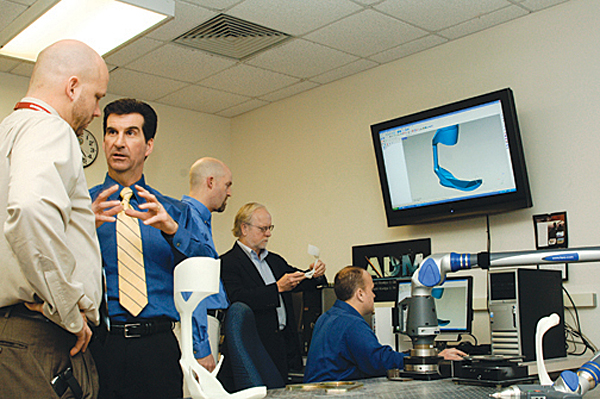


UD awarded $19.5 million grant by DOD
Orthopedic rehabilitation clinical consortium benefits wounded soldiers
10:49 a.m., March 14, 2011----A team of researchers led by the University of Delaware has been awarded a five-year, $19.5 million grant from the Department of Defense to establish evidence-based orthopaedic rehabilitation care that optimizes the ability of soldiers with musculoskeletal injuries to function in everyday life.
The award was made through DOD's Office of Congressionally Directed Medical Research Programs to the BADER Consortium, which brings together military training facilities, academic researchers and rehabilitation institutes. Steven Stanhope, professor in UD's Department of Kinesiology and Applied Physiology, is principal investigator and will serve as consortium director.
Research Stories
Chronic wounds
Prof. Heck's legacy
BADER is an acronym for “Bridging Advanced Developments for Exceptional Rehabilitation.” Typifying exceptional function following injury, Royal Air Force fighter pilot Sir Douglas Bader lost both legs in a plane crash but went on to shoot down 22 German planes and attempt multiple escapes as a POW during World War II.
Stanhope explains that improvements in body armor and emergency care have resulted in soldiers of the Iraq and Afghanistan wars surviving injuries in much greater numbers than those in previous wars. However, this has led to a significant increase in severe orthopedic injuries caused by high-velocity weapons and explosive devices.
Despite extensive medical services and limb salvage procedures, many of these injuries result in significantly impaired musculoskeletal structures and limb amputations.
“Our goal is to see every wounded warrior living a full and engaging life without boundaries -- just like Sir Bader,” says Stanhope, who has a joint appointment in UD's Department of Mechanical Engineering and whose research specialty is biomechanics.
Initial clinical rehabilitation studies will focus on bone health, balance and stability, optimal walking and training to run.
Work under the consortium will also include graduate training of military personnel in rehabilitation research through UD's interdisciplinary Biomechanics and Movement Science (BIOMS) program.
“This is a tremendous grant that opens up new opportunities for collaboration with the U.S. Army at Aberdeen Proving Ground in nearby Maryland,” says David Weir, director of UD's Office of Economic Innovation and Partnerships. “And it falls in what is truly a 'sweet spot' for us -- the convergence of rehabilitation science, advanced materials with functional capabilities, and physical therapy clinical practice. This award and the work that it enables have the potential to lay the foundation for a collaboration with the Army at our Science and Technology Campus on the former Chrysler site.”
At UD, the consortium will catalyze interdisciplinary collaborations between the colleges of Health Sciences and Engineering, as well as with the Center for Composite Materials and the Delaware Rehabilitation Institute.
Other partners in the BADER Consortium include Spaulding/Harvard Rehabilitation Hospital in Boston; the University of Texas at Austin; Christiana Care Health System; the Mayo Clinic in Phoenix, Ariz.; the Naval Medical Center in Portsmouth, Va.; the Naval Medical Center in San Diego; San Antonio Military Medical Center; Walter Reed Army Medical Center in Washington, D.C.; C-Motion, Inc. in Germantown, Md., and the University of Michigan.
Irene Davis, a faculty member at Harvard Medical School, and Ken Kaufman, professor of biomedical engineering at the Mayo Clinic, are co-principal investigators in the consortium. Davis, who retired from UD in 2010 after spending 21 years on the faculty in the Department of Physical Therapy, will be director of research for the consortium. Kaufman will serve as director of BADER's scientific core.
Article by Diane Kukich
Photo courtesy U.S. Army RDECOM, Edgewood Chemical Biological Center, Advanced Design and Manufacturing Division










